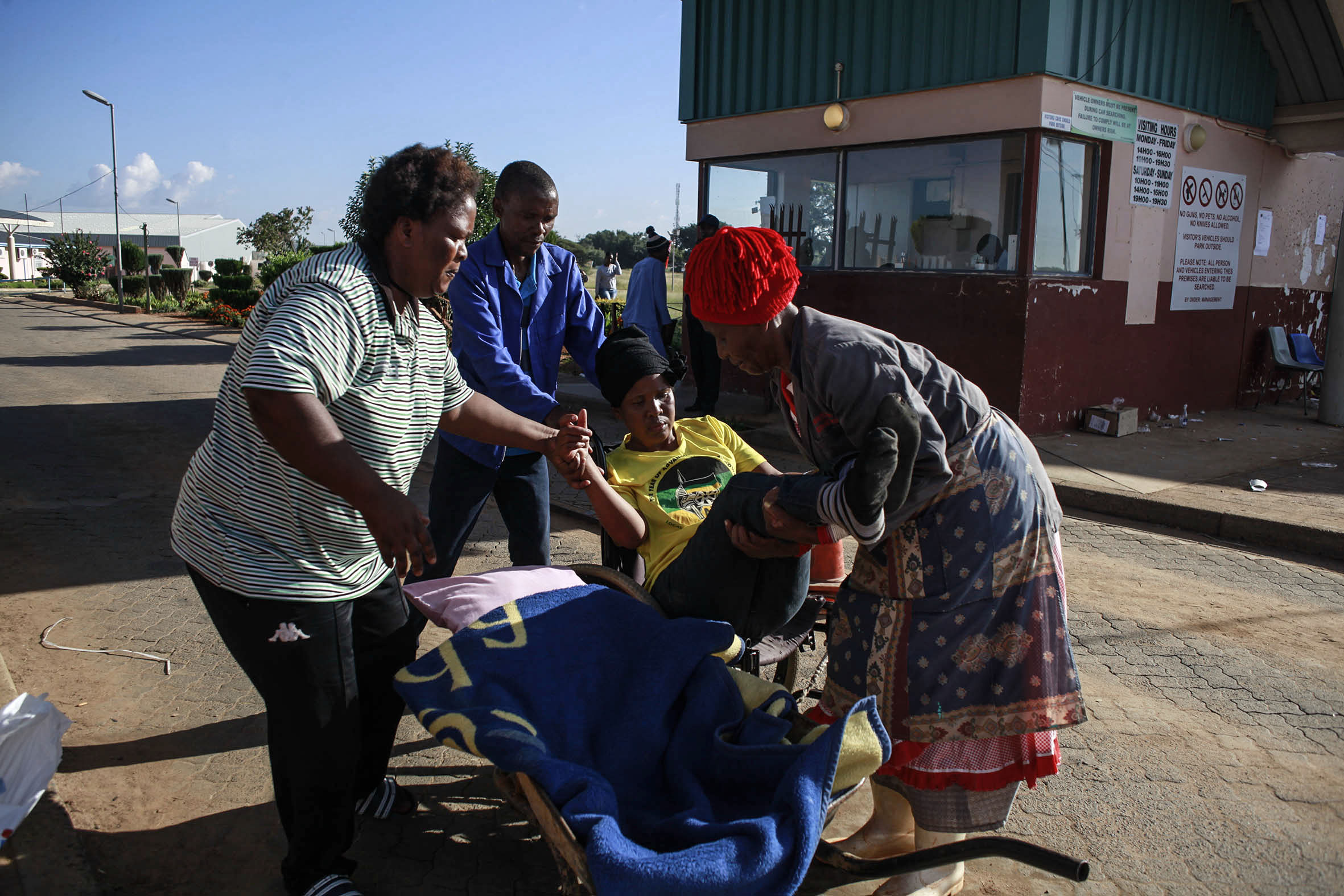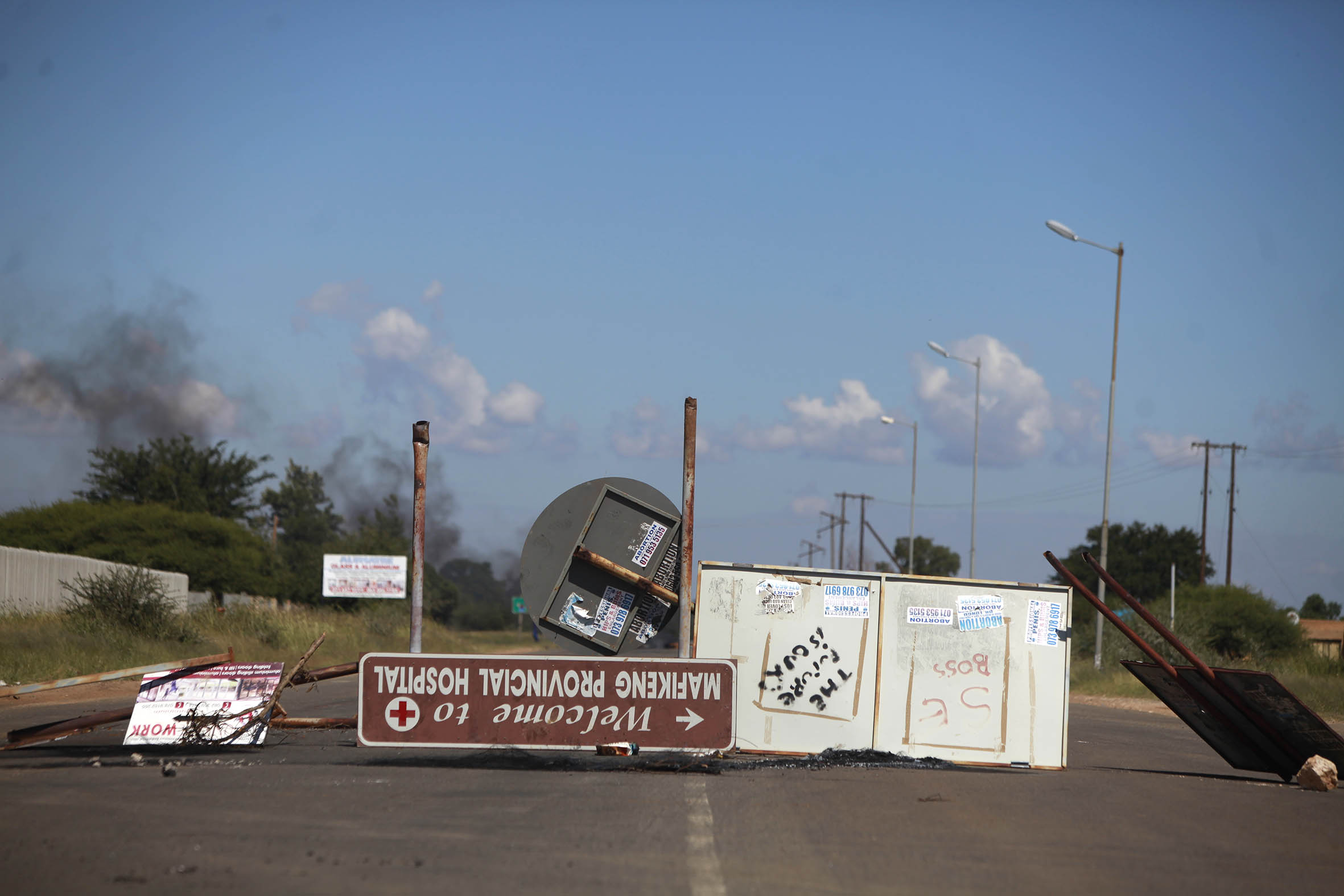Protests by communities
More than a dozen North West health facilities remain closed after more than a week of violent protests. Unions representing healthcare providers have told members not to report to work as they fear for their safety.
Tyres burned outside Klerksdorp’s Tshepong District Hospital Wednesday as protests blocked entrances to the health facility, reported the non-profit Rural Health Advocacy Project (RHAP) via social media.
The hospital has become a beacon for patients fleeing a crippled hospital and shutter clinics 200 km away in the rural Taung, says local doctor Ndiviwe Mphothulo. Under normal circumstances, only the sickest of the sick from Taung would be referred to the Klerksdorp facility.
Tshepong District Hospital later re-opened but health workers at the short-staffed facility remain fearful of possible mounting deaths, warns Tutu Faleni, who is Democratic Alliance (DA) North West spokesperson for health. Members of the opposition party visited the health facility as well as the nearby Khuma Clinic in Stilfontein on Tuesday.
“When we were there, we spoke to a doctor who sees around 130 patients a day who are chronically ill. He says that if this [community protests] continues, in the next 24 hours he’s going to have to start certifying people as dead,” Faleni says.

The Matthews family was forced to cart bedridden cancer patient Ntombizodwa home in a wheelbarrow after healthcare workers were forced to discharge her after the Mafikeng Provincial Hospital was engulfed in demonstrations. (Oupa Nkosi)
Protests erupted last week as many North West residents demanded Premier Supra Mahumapelo resign over allegations of corruption and poor service delivery and particularly healthcare. The National Health Education & Allied Workers Union (Nehawu) and Democratic Nursing Organisation of South Africa (Denosa) have instructed members not to report to work for fear of their safety.
Acting Denosa provincial secretary Motlalepule Ramafoko explains: “Last week, when the community protests started, people went around [health] institutions removing workers one by one. No one can go to work in such circumstances. It cannot be proper that they go work in that situation.”
Nehawu says it’s ready to negotiate to end the go-slow but Denosa continues to stand firm in saying that only Mahumapelo’s resignation will end industrial action.
Meanwhile, a more than two-month-long go-slow by the union members, particularly those at the provincial medicine depot, has led to widespread drug stock-outs in the province.
“At Tshepong, the queue at the pharmacy was unbelievably long. It was filled with patients who need HIV and diabetes medication. “They are getting two weeks supply of medication instead of their monthly supply,” Faleni says.
There is no telling how many people may now be at risk of developing resistance to their HIV medication, warns Vuyokazi Gonyela, national strategic plan advocacy officer with the public interest law organisation Section27.
“Our biggest fear, especially with chronic medication — in particular, HIV and TB — is that if you stay over a week without treatment, you are most likely to become resistant [to the medication].
“Almost everybody in that province who has been without medication for the past two weeks is likely to be resistant. If that is the case, then they are going to need a more advanced type of medication,” she warns.
This advanced medication can be more expensive than standard treatment and comes with more pills as well as side-effects.

More than 70 North West doctors have written an open letter calling for, among other demands, the immediate opening of all health facilities. (Oupa Nkosi)
On Saturday morning, the South African Military Health Service (SAMHS) was deployed to Mafikeng Provincial Hospital after enraged community members removed medical staff from the facility. The military has also taken over the medicine depot.
Nehawu National General Secretary Zola Saphetha says the move to deploy SAMHS is an insult.
“The deployment of the army is not a permanent solution,” he warns.
“Instead of engaging the union on its demands, the department elects to gloss over the problems that engulf the public healthcare sector in the province.”
While the SAMHS may be manning wards in Mahikeng, similar relief seems unlikely for the tens of other health facilities affected by demonstrations.
Instead, North West health department spokesperson Tebogo Lekgethwane says that negotiations to expand military health services will take place “should the need arise”.